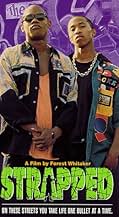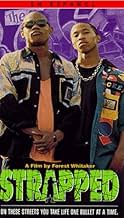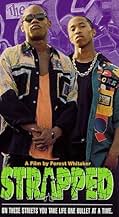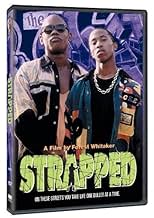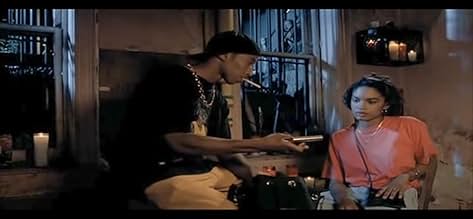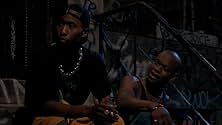Un jóven de raza negra se mueve entre la delgada línea del bien y del mal. Unas veces actúa bien y otras no, atraído por el dinero. Finalmente pese a ayudar a la policía, carga con un asesin... Leer todoUn jóven de raza negra se mueve entre la delgada línea del bien y del mal. Unas veces actúa bien y otras no, atraído por el dinero. Finalmente pese a ayudar a la policía, carga con un asesinato que no cometió porque en la calle lo mataríanUn jóven de raza negra se mueve entre la delgada línea del bien y del mal. Unas veces actúa bien y otras no, atraído por el dinero. Finalmente pese a ayudar a la policía, carga con un asesinato que no cometió porque en la calle lo matarían
- Dirección
- Guión
- Reparto principal
- Premios
- 1 premio y 3 nominaciones en total
- Chucky
- (as Willie James Stiggers Jr.)
- Man in Hallway
- (as Hugh L. Hurd)
- Latisha Jordan
- (as Kia Joy Goodwin)
- Lay Lay
- (as Jermaine Hopkins bka 'Huggy')
- Bamboo
- (as Fredro)
Reseñas destacadas
It is clear from the end credits' text and the title of this movie that the pervasive message is one of gun control. I would be naïve to believe that the plethora of guns, particularly in the inner cities (or ghettos if you will), have nothing to do with the amount of violence in those same places. Guns absolutely play a role and are a factor in the violence. But I'd be equally naïve to believe that there are not myriad other contributing factors to the violence. And what was apparent in the movie "Strapped," by Forest Whitaker, was that hopelessness and thuggishness were as big, if not bigger, contributors to inner-city violence than even the guns. Not that hopelessness and thuggishness (or thuggery) always exist together, but hopelessness is definitely the main pillar of thuggishness. Remove hopelessness and thuggishness goes with it.
Enough of the societal ills speech.
As far as the movie is concerned, it was OK, but it had a lot of stiff competition at that time. I'd say that the late 80's/early 90's--probably starting with "Colors"-- produced quite a few movies centered around life in the 'hood; with some of your better movies being "Colors," "Boyz in the Hood," "South Central," "Menace to Society," and a couple of others. You can even extend the list to add movies like "The George McKenna Story," "Lean on Me," and "Stand and Deliver." Even though they were education based, they dealt with young people in the 'hood.
So, with the aforementioned movies already being so prominent, what was going to make "Strapped" stand out? As it was, I saw "Strapped" as a different version of the movie "Juice." "Strapped" is almost identical to "Juice." Both took place in New York. Both had a relatively levelheaded main character (Q, played by Omar Epps in "Juice" and DiQuan, played by Bokeem Woodbine in "Strapped"). Both had a hot-headed supporting actor (Bishop, played by Tupac in "Juice" and Bamboo, played by Fredro Starr in "Strapped"). And the main theme to "Juice" was you had juice if you were strapped. So, what you found is that Bishop in "Juice" became an untamable monster by virtue of having a gun; while Bamboo (Fredro Star), in the movie "Strapped," wilds out for virtual the same reason (and it's not lost on me that the two gun-happy characters have names that start with "B" and were played by rappers).
"Strapped" is essentially the same story as "Juice" with a little more emphasis on the wide distribution of guns in the ghetto. I happened to like "Strapped" more than I like "Juice" simply because of the two hyperbolized characters (Bishop and Bamboo), Bishop was the most outrageous. His behavior seemed extremely manic when nothing changed but his acquiring a pistol.
With a bevy of prior similar movies and a more popular movie that was nearly identical, "Strapped" failed to distinguish itself. Add to that the sub-standard cinematic quality, dialogue, and acting, "Strapped" just didn't cut it. It is watchable, I just wouldn't watch it twice.
But the acting wasn't convincing most of the time, and the Brooklyn portrayal, which includes the character's choices of clothing, didn't give a realistic image of the Brooklyn I know. I would also probably change the music in the film, cut-out the snippets of reggae music during the revealing of a gun in the film, and the emphasis made on the main actors to look like thugs. The actors over did their performances as criminals most of the time and it was a bit distracting to someone, like myself, who grew up hanging out with true thugs from the streets of Brooklyn, New York.
But besides all of that, the film was still great. From a grade of A+, being excellent, to a F, being the worst, I give this film a C...
The ending leaves a sour taste in the mouth. Sure, it may be intentional but it unravels the whole point of the movie. What I thought was the story of a ex-con trying to make good his life suddenly ends in a socio drama reflecting the sad situation of the black community in Brooklyn. Everything seems to be a wasted effort -- there's just no conclusion.
It has an original story. Plenty of good plot development.
The acting was good most of the time. Sometimes it would seem a tiny bit bad but all and all it was pretty good. Bokeem Woodbine who plays the main character stands out, as does Fredro Starr who plays his friend. Also good acting by some of the younger members of the cast.
One thing that stood out was the soundtrack. Not just because it was rap music and this is a hood movie, the songs were appropriate to what was happening at the time in the movie.
Another good thing was the directing. Great job Forest Whitaker! That stood out as well.
Overall it should prove to be an entertaining, exciting and powerful movie with a powerful message. Another must see for hood movie fans.
¿Sabías que...?
- CuriosidadesFredro Starr and Bokeem Woodbine's film debut.
- Citas
Matthew McRea: Diquan, you don't have to do this.
Diquan Mitchell: Man, what do you know about it? You don't live in my world. My grandma cleans your apartment.
- ConexionesReferenced in Cult Legends and Rising Stars: Cult Legends: Bokeem Woodbine (2016)
- Banda sonoraI Just Can't Help Myself
Performed by Gerald Levert
Written by Gerald Levert and Tony Nicholas
Courtesy of EastWest Records America/The Atlantic Group
By Arrangement with Warner Special Products
Selecciones populares
Detalles
- Duración1 hora 44 minutos
- Color
- Relación de aspecto
- 1.78 : 1
Contribuir a esta página


